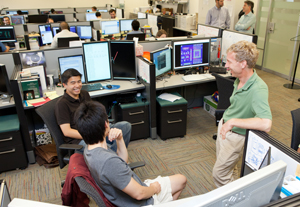Prof. David Blaauw Elected Fellow of the IEEE

 Enlarge
Enlarge
Prof. David Blaauw has been named an IEEE Fellow, Class of 2012, “for contributions to adaptive and low power circuit design.”
Prof. Blaauw was a core member of the Michigan team that developed the award-winning circuit known as Razor in 2003, which at the time showed a radical departure from traditional circuit design. Typical circuits are designed to operate virtually perfectly at all times, which leads to higher power consumption and lower performance. Razor, on the other hand, was designed to eliminate safety margins and instead use self-checking, or adaptive, mechanisms which ensured computational correctness at the same time that it reduced power consumption and increased overall performance.
The paper “Razor: Circuit-Level Correction of Timing Errors for Low-Power Operation” appeared in the 2004 IEEE Micro Top Picks special issue on the most industry relevant and significant papers of the year in computer architecture, and in 2008, Prof. Blaauw and U-M colleague Prof. Todd Austin received the Richard Newton GSRC Industrial Impact Award for “development of the Razor technology” from the GigaScale Systems Research Center (GSRC), which recognizes research with significant industrial impact that is at least five years old. The use of Razor-inspired adaptive approaches to circuit design continues to be explored by Prof. Blaauw and his collaborators in industry.
One of the key novel techniques used in Razor was to operate the chip at a voltage level so low as to be near the point of failure. Blaauw’s continued research into low voltage design culminated in the design of ultra-low power circuits suitable for millimeter-scale sensors. Specifically, he and colleague Prof. Dennis Sylvester developed a chip known as the Phoenix Chip to the point where it it was incorporated into a 1.5mm3 solar-powered sensor system that is the smallest system of its type ever to be reported.
This system was developed as an intraocular pressure sensor – a sensor so small it is planned to be inserted into the human eye to monitor pressure in glaucoma patients. These tiny millimeter-scale sensors mark the next frontier in computing and sensing. [read more]
Based on his work with the Phoenix chip, Prof. Blaauw co-founded the startup company Ambiq Micro in 2010 with Prof. Sylvester and Dr. Scott Hanson (BSE MSE PhD EE ’04 ’06 ’09). Ambiq Micro is an early stage fabless semiconductor company that is developing ultra-low power mixed-signal solutions for a new generation of wireless electronics; it recently attracted seed funding of $2.4M. [read more]
Prof. Blaauw joined the faculty at the University of Michigan in 2001, after nearly a decade working in industry at IBM, Motorola, and Advanced Design Technology. He maintains close ties with the semiconductor industry, in particular the company ARM Limited, which licenses intellectual property for energy-efficient processors used in a wide range of applications. ARM technology can be found in the Phoenix processor, and the company maintains a close research partnership with Blaauw and several other U-M faculty.

 Enlarge
Enlarge
Prof. Blaauw has received numerous awards for his innovative work, including the Richard Newton GSRC Industrial Impact Award, the Microprocessor Review Analysts’ Choice Award in Innovation, and the Motorola Innovation Award. He is the author of 32 patents.
In addition, he has received the U-M Henry Russel Award, the College of Engineering Research Award, and along with his colleagues the College of Engineering Ted Kennedy Family Team Excellence Award for individual and combined efforts in low-power compuitng.
He is regularly invited to present talks and keynote addresses at professional conferences as well as in university and industrial settings, and he and his students have received numerous Best Paper awards throughout the previous decade.
Prof. Blaauw received his master’s and Ph.D. degrees from University of Illinois at Urbana-Champaign in 1989 and 1992 respectively, and his bachelor’s degree from Duke University.
More about IEEE Fellows:
The IEEE Grade of Fellow is conferred by the IEEE Board of Directors upon a person with an outstanding record of accomplishments in any of the IEEE fields of interest. The total number selected in any one year cannot exceed one-tenth of one- percent of the total voting membership. IEEE Fellow is the highest grade of membership and is recognized by the technical community as a prestigious honor and an important career achievement.
The IEEE is the world’s leading professional association for advancing technology for humanity. Through its 385,000 members in 160 countries, the association is a leading authority on a wide variety of areas ranging from aerospace systems, computers and telecommunications to biomedical engineering, electric power and consumer electronics.
 MENU
MENU 
